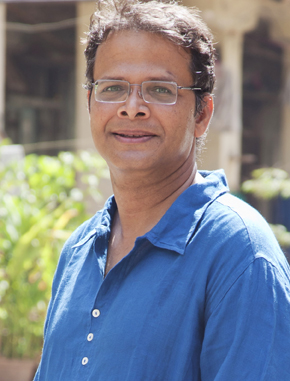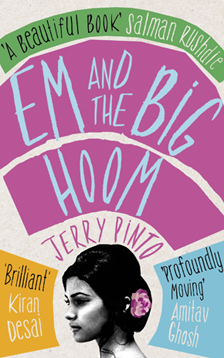Jerry Pinto in full voice
by Fiona MelroseIn Em and the Big Hoom, Jerry Pinto invites the reader to inhabit the complicated lives of a family trying to deal with the manic-depressive episodes of its matriarch. The dialogue is often wild and quick and yet betrays the subtle aches of a family whose collective heart is breaking.
FM: Jerry, thank you for taking the time to answer my questions and for your wonderful book. I read it in one sitting and laughed and cried almost in the same breath.
JP: You completely wonderful reader, you.
Em, the narrator’s mother – and the narrator himself – are fantastically unreliable; a result of the illness and the alternate viewpoints that come with it. Em often doesn’t know her own mind and her son is trying to understand something he can never really grasp. This is so skilfully navigated. For all Em’s meanderings and diversions, the reader is never lost. Was the choice to write from the son’s point of view an early decision, perhaps to offer the reader an anchor?
This thing about the unreliable narrator? I want to know who is the reliable narrator. No, wait, I have an idea: that’s a definition of God. Because everyone else is unreliable. If you tell a story three times, the same story, over the course of three years, you will find your own story has begun to change. Telling changes things, that’s the magic of telling. If it kept them the same, why would we be telling anyone anything?
Thank you for saying it was skilfully navigated. Sometimes it was easy, this led to that, this comes here, that goes there, done and dusted. And then an idea pops up and you think, if I fit it in here… and then the whole thing comes down like dominoes. So you learn as a writer not to trust anything that looks like it’s all fitting together because there’s a word just under your left pinkie that is waiting to trip you up. You fall, you get up again and you try again and again. If you don’t like being trapped and hazed by words, you have to find another job.
I love to think of myself as making decisions, but this is how I work: Start writing. Finish writing. Read. Say, “Shit, this isn’t working”. Start again. This may be why it took me twenty years. Perhaps if I had started by saying to myself, “I need a decision about first person singular versus ominiscient observer” I would have got there faster, but then I would have to be another person.
Language is so wonderfully fluid and exciting in the novel. I laughed out loud at some of Em’s clever puns and her wicked way with words. To what extent is this stretching of language and reimagining of words a product of the internal imagination of the characters, especially Em? And how much is it a product of the enjoyment of language such as English when it is a second or even a third language in a society?
I keep feeling I have to say thank you because you are a wickedly clever interviewer. But thank you. Laugh out loud? I am so glad you did. It’s a book that starts with a suicide victim telling her son he brought her to that state, thanks kid. But joy and grief is woven fine, as Blake said. And language is both a joy and a grief. In India, English is everything: passport to success, killer of the native tongue. But it is also such a seduction, no? For me English is my mother tongue. My mother and father both spoke Konkani (the language of the state they were born in, Goa) and Portuguese (the language of the coloniser) but they both loved English and I inherited that love. I read Hindi, Marathi, Urdu and Konkani but my first and last love is English. Bring on the brickbats.
This feels like a book that could have been written anywhere, these are such grand and universal themes of duty, love, suffering, life and death, home and family – and yet they found their home in this small flat in India and Ward 33 where Em keeps finding herself. How does the specific work in addressing the universal for you and in literature in general?
You spend twenty years writing a book and then you wake up in the middle of the night and you think, “Oh Great Muse and Eternally Splendid Book Buyer of the Chain Store, why would you be interested in a book about four Roman Catholic Indians in a tiny flat in Mumbai?” And then you think to yourself, “Jerry, you putrefying lump of lard, why didn’t you set it in The Great War and give it some political tensions and some big themes?” And then you thump your pillow and turn your face to the wall and grind your teeth into grey powder. But then a clever interviewer comes along and says you have put in all the grand themes and that’s so nice, I am going to lie in bed all night and just think about this question.
Your dialogue is fantastically energetic and Em’s voice is electrifying particularly when set against the stoicism of her husband and the narrator’s father Augustine (‘The Big Hoom’ of the title), who is so beautifully controlled. Where did Em’s voice come from, was it a known voice or something you had to excavate?
I love eavesdropping. I love listening to the way people speak and the way they express themselves. Which was why I loved being in England because everyone was speaking a language I could understand and I could eavesdrop on meaningless conversations about Somebody in Somebury. I loved America even more because you could even join the conversation about how someone felt used by someone else and then realised that it wasn’t the user’s fault because he must have somewhere wanted to be used.
So sometimes I just write pages and pages of dialogue and I keep saying, “Jerry, stop, these people are not just here to talk, perhaps they must also get on with things.” But I have learned to keep at it and write and write and then cut and cut and cut and cut and leave what sounds right on the page.
Augustine is heartbreakingly understated. Was he a structural invention, a conscious attempt to offer a counterpoint to Em’s chaos, or was he simply organic to the story?
Organic. He was organic. I don’t know how to say this but I couldn’t have invented him. He invented himself. Like those pieces of bread that have the face of a saint? Do you have those or did you get rid of all your saints with the Reformation? No, I’m babbling because I don’t know the answer. Let me try. You build everyone out of words but you take care when there are very few words. No, I’ll try again. See, Em is the central character. She’s fulcrum and she’s lever; she’s black hole at the centre and supernova in the sky above. But she must have something to hold her before she spins out of control. That’s The Big Hoom. He’s gravity or that force that Einstein was trying to find.
So much of this book is about duty and love, doing what we must do; the children and Augustine fulfilling their roles under such painful and even terrifying circumstances.
Family in India is a terrible thing. Family in India is a terrific thing. Chhah, why am I saying this? Family anywhere is both a terrific invention and a terrible invention. It’s nurturing and loving and it’s constricting and demanding. You leave and you’re guilty. You stay and you’re bitter. Or so I thought in my Manichean fashion. Now I think there are middle paths and some of the bitterness can be guilt-edged bonds.
How would you like us to remember Em? What would you like us to take with us?
The laughter. And the dancing. Inside my head, she’s always dancing.
Jerry Pinto is a freelance writer and editor based in Mumbai. He has written books on gender politics and Bollywood, edited poetry anthologies, and is guest lecturer at the Social Communications Media department of the Sophia Polytechnic. Em and the Big Hoom, his first novel, is published by Viking and Penguin in hardback and eBook. Read more.
jerrypinto.com
“A child’s-eye view of madness and sorrow, full of love, pain, and, unaccountably, much wild comedy. One of the very best books to come out of India in a long, long time.’
Salman Rushdie
Fiona Melrose is a novelist and reviewer based in Johannesburg, and a contributing editor to Bookanista. Follow her on Twitter: @PaperCutPrint



